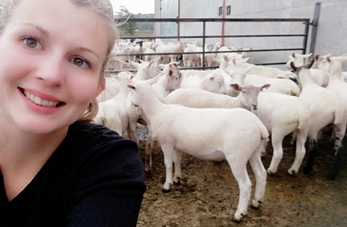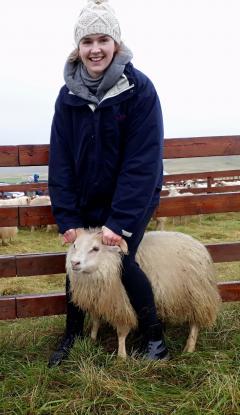Visitors
Visitors to the ruminant functional genomics lab past and present.
Dr Stephen Bush
Stephen worked at The Roslin Institute as a Research Fellow in David Hume's research group from 2014-2017. During that time he undertook the bioinformatic analysis of the sheep gene expression atlas dataset, and was a key member of the team. He also contributed to the analysis of other gene expression atlases and RNA-Seq projects that were on-going at the time. He is now based at the University of Oxford in the Nuffield Department of Clinical Medicine. Stephen is a visiting scientist in the ruminant functional genomics lab and contributes to the analysis and design of on-going projects remotely.
Stephen J Bush ResearchGate profile

Miss Manon Mazars
Master’s degree equivalent in agronomy by apprenticeship
Currently, I am an apprentice agricultural engineer; I will start my last year. I study in VetAgro Sup, the National Institute of Agronomy in Clermont-Ferrand (France). I reinforce my theoretical knowledge in animal production acquired during my HND, such as reproduction, growth, or nutrition. In paralell, I work in APROVIA (Sheep Meat Producers Association of the Aveyron), a producers’ organisation which includes about two thousand and fifty ovine breeders. With the support of technicians, I provide technical support to farmers in order to improve their lamb production in terms of quantity and quality. I also carry out farm diagnosis to identify possible problems and rectify them. I have always been interested in the selection of livestock, and therefore indirectly in genetics. Which is why I did an internship at the UPRA Lacaune, a selection organization. There I participated in phenotypic assessment of the ewe lambs and in the ewes udder scoring, for the improvement of the Lacaune breed. When I joined Emily Clark at the Roslin Institute, I discovered the upstream side of selection: genetics. This 4-week internship is the best opportunity for me to discover ruminant functional genomics. I learned to quantify DNA, perform PCRs and gel electrophoreses; all these techniques are new to me. Finally, I am now able to establish the link between laboratory analyses and application on farms.
Miss Alex Caulton

I am a PhD student at the University of Otago, in collaboration with AgResearch, New Zealand. In 2018 I completed a Master of Science program in Genetics, endorsed with distinction at the University of Otago, New Zealand. My masters project involved development of a high-throughput targeted genotyping assay for production-relevant traits in farmed Atlantic salmon. As an interdisciplinary project combining molecular technologies with bioinformatics and statistical analysis, I enjoyed gaining a range of research and analytical skills.
My current PhD project forms part of the Ovine Functional Annotation of Animal Genomes (FAANG) Project, which has the key goal of delivering enhanced functional annotation of the ovine genome by generating and distributing curated transcriptome data. This will be accomplished through a collaborative effort, conducting extensive analyses for gene expression, DNA methylation, nucleosome positioning, histone modification and proximity of sequences in the sheep genome.
The component of the Ovine FAANG project, which will be undertaken in my PhD study, focusses on characterisation of tissue specific signatures of methylation at the genomic level in sheep. During my 3 month visit at the Roslin Institute I will be overlaying tissue specific methylation profiles with CAGE-seq data produced by the Ruminant Functional Genomics Team here. This work will help to elucidate the relationship between DNA methylation and transcription initiation in different tissue types in sheep. Establishing an ovine epigenomic profile will facilitate greater understanding of gene regulation and enable identification of genomic regions that influence phenotypes of interest.

